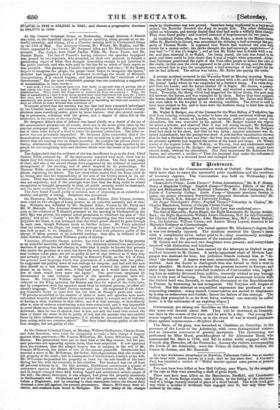At the Central Criminal Court, on Monday, William Girdlestone, Charles
Swam, and John Saunders, were tried for conspiring to make a false charge of forgery against three gentlemen—Mr. Francis M'Gowran, Mr. James M`Gowran, and Mr. Barton. The prosecutors were put on their trial at the May session; but the present prisoners not appearing against them, they were acquitted. It now appeared from the evidence, that the alleged forgery was in relation to the will of Mr. Francis M'Crowran, the father of two of the present plaintiffs. Girdlestone had married a niece of Mr. litGownin, the father, with expectations that she would he left property at his death; but in consequence of Girdlestone's conduct to his wife,
.M'Gowran bequeathed his property in trust for the sole benefit of his niece during her life with the reversion to her children. The husband was cut off from all personal interest in it. On this account, Girdlestoue commenced a system of annoyance against the Messrs. M`Gowran and their brother-in-law, Mr. Barton; and at length charged them with having forged and substituted certain sheets of the will: the sheets destroyed, it was alleged, had given the property absolutely to Crirdlestone's wife. Girdlestone and the other two prisoners made the charge before a Magistrate, and by swearing to their statements bethre the Grand Jury obtained a true bill against the present prosecutors. Messrs. M`Gowron were arrested, and confined some hours in Newgate. The utter falsity of the charges
made by Ginilestone was now proved. Saunders being implicated to a very resat extent, the Recorder directed the Jury to acquit him. The other defendants called no witnesses, and merely denied that they had made a wilfully false charge. They were found guilty; and received sentence of imprisonment for two years.
At Guildhall Police-office, on Tuesday, Mr. Eicke, a clerk in the Money-Order Office St. Martin's-le-Grand, was summoned for defacing a half-sovereign the property of Thomas Walsh. It appeared that Walsh had tendered the coin with others for a money-order; the clerks thought the half-sovereign auspicious" it was lead "—" it was n't weight "; and at last Mr. Eicke beat it double with a re., ler, and then returned it to Walsh. On being tested, the coin was found to be good, and there could be little doubt that it was of weight when presented. Alder. man Sidomans questioned the right of the Post-office people to deface the coin of the realm: in this case the clerk appeared to be quite in the wrong, and the Alderman advised him to give the complainant a halt-sovereign of full weight for the one he had defaced. The advice was taken; Mr. Eicke also paying the costa.


























 Previous page
Previous page